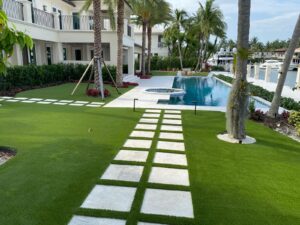Installing pavers for your pool deck can transform your outdoor space into a beautiful, functional oasis. Whether you’re aiming for a sleek modern look or a more natural aesthetic, pavers offer versatility and durability. Here’s what you need to know when considering pavers for your pool deck.
1. Choosing the Right Pavers
- Material Options: Pavers come in various materials, each with its own benefits.
- Concrete Pavers: Durable and available in many colors and shapes.
- Natural Stone Pavers: Luxurious and unique, options include travertine, limestone, and granite.
- Brick Pavers: Classic look, very durable but may require more maintenance.
- Color and Style: Choose colors that complement your home and landscaping. Lighter colors reflect heat, keeping the surface cooler.
2. Surface Texture and Safety
- Slip Resistance: Pool decks can be slippery, so choose pavers with a textured surface to prevent slips and falls.
- Heat Resistance: Some materials retain heat more than others. Natural stone pavers generally stay cooler underfoot compared to concrete.
3. Design Considerations
- Pattern and Layout: Decide on a pattern that enhances the aesthetic appeal. Popular patterns include herringbone, basket weave, and running bond.
- Border and Accents: Incorporate borders or accent pavers to add visual interest and define the space.
4. Installation Process
- Site Preparation: Proper preparation is key to a long-lasting installation. This includes excavating the area, laying a base material like gravel, and ensuring proper drainage.
- Professional Installation vs. DIY: While DIY can save money, professional installation ensures the job is done correctly and efficiently. Pros can handle complex patterns and provide warranties.
5. Maintenance Requirements
- Regular Cleaning: Keep your pavers looking new by regularly sweeping and washing with mild detergent.
- Sealing: Sealing your pavers can protect against stains and color fading. It’s typically recommended every 2-3 years.
- Weed and Moss Control: Address weeds and moss that can grow in the joints between pavers. Regularly sweeping and applying a joint stabilizing sealer can help.
6. Cost Considerations
- Material Costs: Prices vary widely based on the material chosen. Natural stone is typically more expensive than concrete or brick.
- Installation Costs: Labor costs can be significant. Get multiple quotes from reputable contractors to ensure a fair price.
- Long-Term Value: While the upfront cost might be high, pavers add value to your property and are more durable and easier to repair than other materials.
7. Environmental Impact
- Eco-Friendly Options: Some pavers are made from recycled materials. Permeable pavers allow water to pass through, reducing runoff and helping with water management.
- Local Sourcing: Opt for locally sourced materials to reduce the environmental impact of transportation.
8. Permits and Regulations
- Local Codes: Check with your local municipality regarding any permits required for installing a pool deck.
- Zoning Laws: Ensure your project complies with local zoning laws and pool safety regulations.
9. Selecting a Contractor
- Experience and Reputation: Choose a contractor with experience in pool deck installations and good reviews.
- Portfolio: Ask to see a portfolio of previous work to ensure their style matches your vision.
- Warranty and Insurance: Ensure the contractor offers a warranty on their work and is fully insured.
Installing pavers for your pool deck is a significant investment that can enhance the beauty and functionality of your outdoor space. By considering the right materials, safety features, design elements, and maintenance needs, you can create a stunning and durable pool deck that you’ll enjoy for years to come. Remember to do your research, plan meticulously, and hire a reputable contractor to bring your vision to life.
Artificial Grass & Paver Pros

Porcelain Paver Installation
(727) 513-4240
